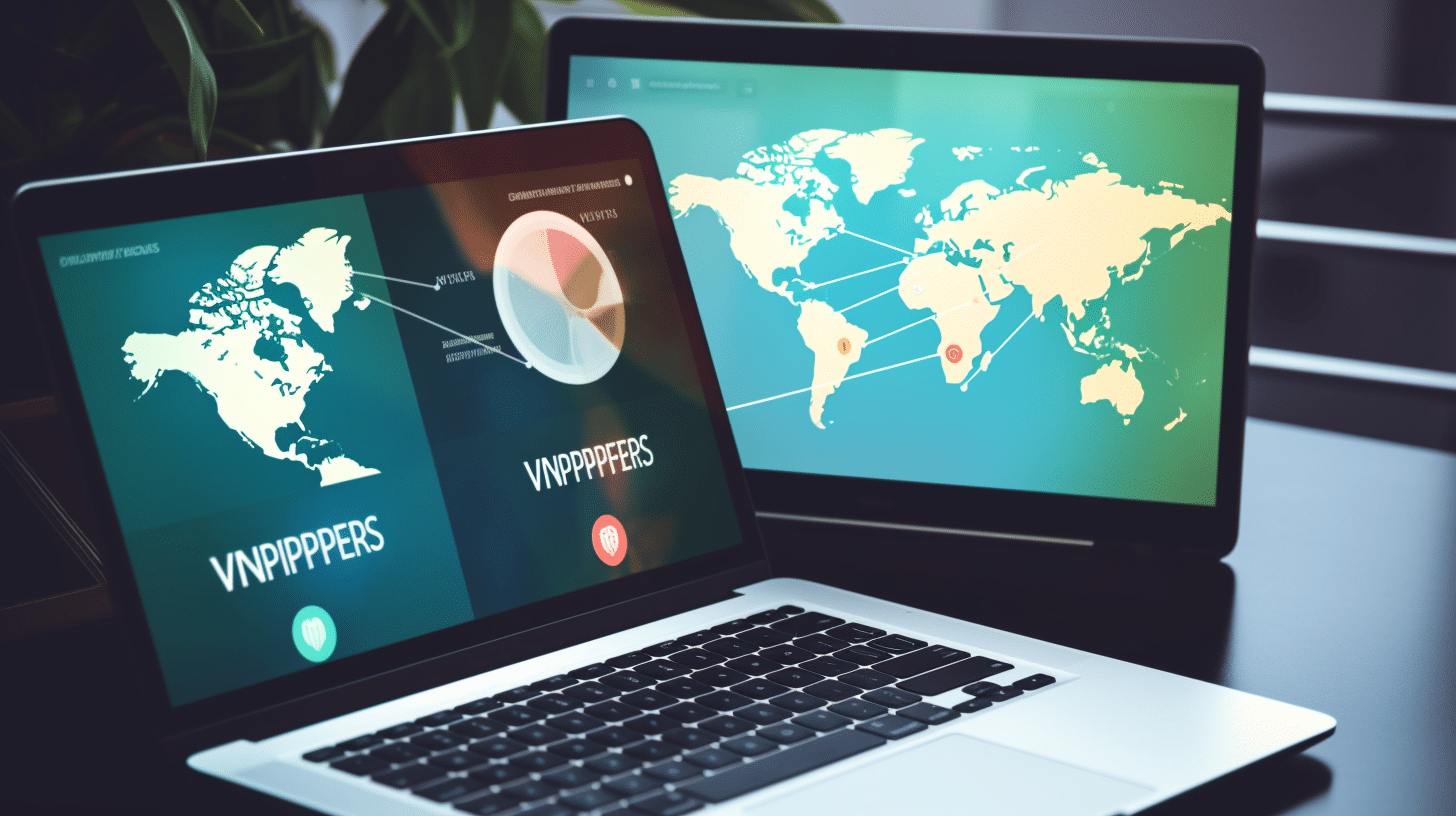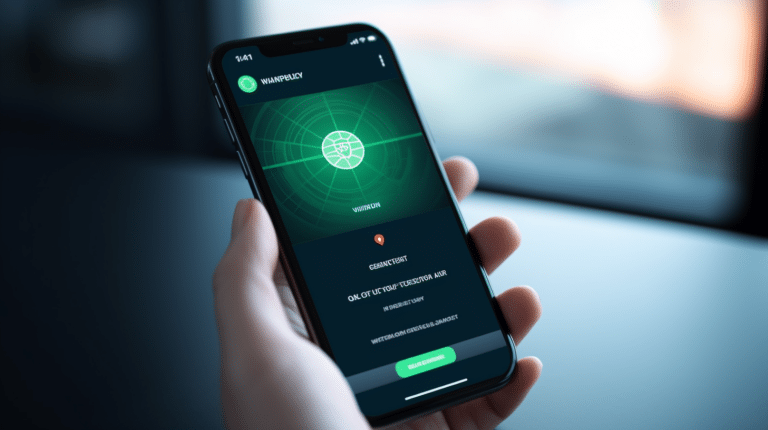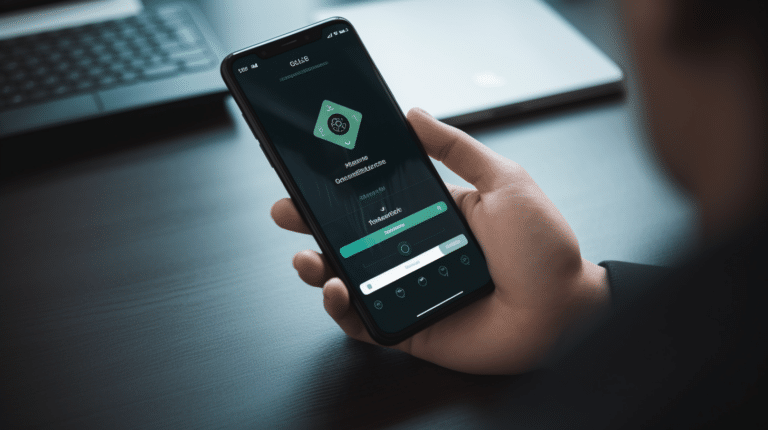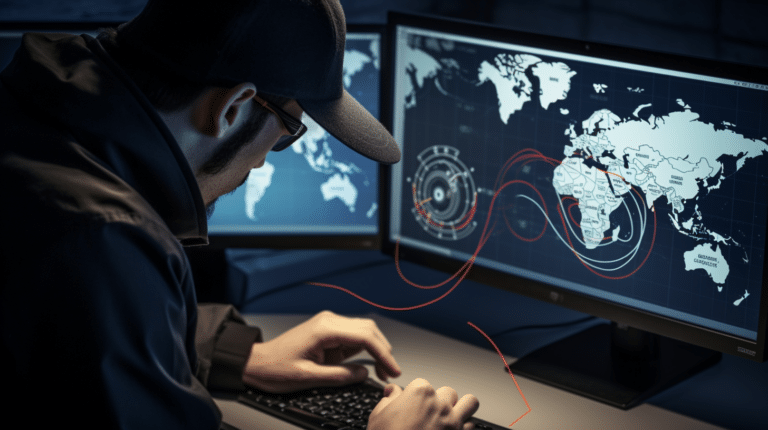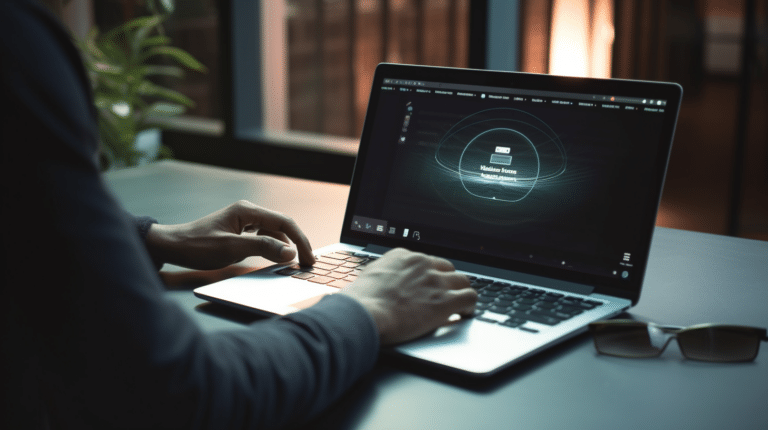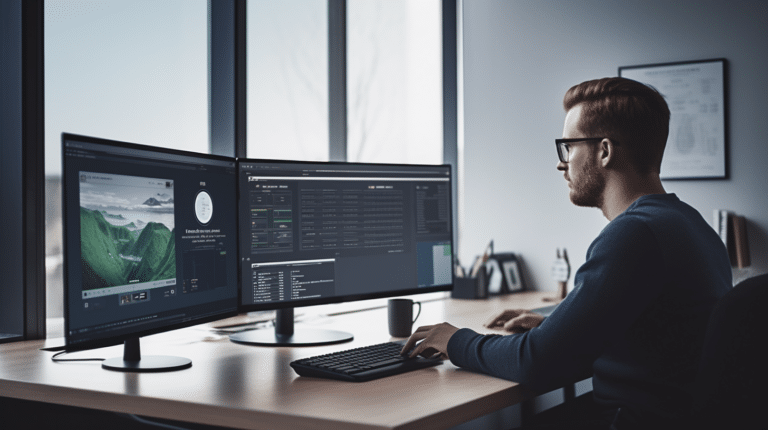In today’s digital era, privacy and security concerns are at the forefront of many conversations. One technology developed to address these challenges is the Virtual Private Network, or VPN. A VPN is designed to create a secure, encrypted connection between your device and the internet, masking your online activities and location. This not only protects your data from potential threats but also allows you to access restricted content, making VPNs an essential tool in maintaining online privacy and security.
However, not all VPNs are created equal, and it’s crucial to understand how they work and their potential drawbacks. When choosing a VPN service, it’s important to consider factors such as encryption, available servers, speed, and reliability. Additionally, be aware that while a VPN can provide online privacy and security, it cannot guarantee complete anonymity, and some government agencies or ISPs may still track your activities.
Key Takeaways
- VPNs create a secure, encrypted connection, enhancing privacy and security online
- They allow access to geo-restricted content and can be helpful on public Wi-Fi
- It’s crucial to choose a reliable VPN service, considering factors like encryption and speed.
Benefits of a VPN
Enhanced Security
A VPN (Virtual Private Network) significantly improves your online security by encrypting your data and making it anonymous. This makes it difficult for hackers, ISPs (Internet Service Providers), and other malicious actors to intercept or monitor your online activities. VPNs also protect against cyber threats like Wi-Fi snooping and man-in-the-middle attacks when using public Wi-Fi networks.
Protecting Privacy
In addition to improving security, VPNs also protect your online privacy. By routing your internet traffic through a VPN server, your IP address is masked, making it seem as though you are accessing the internet from the server’s location. This keeps your browsing habits, location, and personal information hidden from websites, ISPs, and other third parties trying to track your online activity.
Improved Internet Experience
Using a VPN can also enhance your overall internet experience. Some ISPs may throttle your bandwidth or slow down specific websites. By connecting through a VPN server, your connection is encrypted, making it difficult for your ISP to determine your activity or apply these restrictions. As a result, you may experience faster connection speeds and an improved internet experience.
Bypass Geographical Restrictions
VPNs allow you to access geo-restricted content by connecting to servers in different countries. For example, you can watch streaming services that are available only in specific regions. By connecting to a VPN server in the desired country, you can bypass these restrictions and enjoy unrestricted access to websites and content. This is particularly useful for travelers or expats who want to access their favorite websites and services from abroad.
Note: Using a VPN to bypass geo-restrictions can sometimes be against the terms of service for certain websites and services. Make sure to familiarize yourself with their policies before using a VPN for this purpose.
In summary, a VPN provides enhanced security, protects your privacy, improves your internet experience, and helps bypass geographical restrictions. By choosing the right VPN, you can significantly enhance your online experience while maintaining a high level of data privacy and security.
Understanding How a VPN Works
A VPN, or Virtual Private Network, is a tool that helps protect your online privacy and security by creating an encrypted connection between your device and a VPN server. In this section, we’ll delve into the details of how it works and the benefits it offers.
Encryption
One of the primary features of a VPN is encryption. When you connect to a VPN, your internet traffic is encrypted, which means your data is turned into a complex code that cannot be easily deciphered by anyone intercepting it. This ensures that your sensitive information, such as login credentials, and online activities remain secure from prying eyes and hackers.
Anonymity
Another key aspect of a VPN is the ability to provide anonymity while browsing the internet. When you’re connected to a VPN, your public IP address is replaced with the VPN server’s IP address. This makes it difficult for websites, ISPs, and other third parties to track your online activities and associate them with your identity. By using a VPN service, you’re also able to access geo-restricted content, as your apparent location is determined by the VPN server you’re connected to.
Connection Process
The connection process of a VPN involves a few steps:
- When you initiate a VPN connection, your device sends a request to the VPN server.
- The VPN server responds by establishing a secure, encrypted tunnel between your device and itself.
- Your internet traffic passes through this tunnel and is encrypted, ensuring that your online activities remain private and secure.
- The encrypted traffic is then sent over the internet to the destination website or service.
- The VPN server receives the response from the destination, encrypts it, and sends it back through the secure tunnel to your device.
In summary, a VPN provides encryption and anonymity by creating a secure, encrypted connection between your device and a VPN server, effectively routing your internet traffic away from potential eavesdroppers and hackers. By using a VPN service, you can ensure the privacy and security of your online activities.
Potential Drawbacks of Using a VPN
While VPNs offer numerous benefits, there are also some potential drawbacks to consider. One issue that may arise when using a VPN is slower internet speeds. Due to the encryption process and the additional routing through a VPN server, your connection speed may be affected, sometimes significantly enough to cause noticeable delays in loading web pages or streaming content MUO.
In addition to slower speeds, some VPN services may not provide the level of privacy and security that you may expect. For instance, a VPN service may claim not to keep logs of your online activities; however, this is not always the case. Some have been known to retain traffic logs, which could potentially be accessed by third parties MacPaw. Therefore, it is essential to thoroughly research and choose a reputable VPN provider that prioritizes your privacy.
Another potential drawback is limited access to certain websites and services while connected to a VPN. Some websites or streaming services, like Netflix, may restrict access to their content if they detect that you are using a VPN to bypass geographical restrictions Comparitech. Similarly, some countries may block or restrict access to VPN servers altogether, limiting the availability and effectiveness of VPNs in those regions.
Lastly, it is worth mentioning that using a VPN may not be necessary for everyone, depending on their specific needs and internet habits NYTimes. Some people may find that their internet service provider already offers sufficient encryption and privacy protection, making the use of a VPN redundant in this case. Additionally, using a VPN may not always be the most effective method for improving your online security, as there may be other options or tools that are more suitable, given your specific requirements.
In conclusion, while VPNs can offer numerous benefits such as increased privacy and security, there are also some potential drawbacks to consider. Ensuring that you thoroughly research and choose a reputable VPN provider, and weighing these drawbacks against the benefits, is crucial for obtaining the best possible online experience.
VPN and Online Streaming
A VPN, or Virtual Private Network, is a tool that provides a private and secure connection to the internet. It is particularly useful for online streaming due to its ability to bypass content restrictions and protect user privacy. In this section, we’ll explore how VPNs can enhance your streaming experience on platforms like Netflix, Hulu, and YouTube.
Streaming Services
Streaming services such as Netflix, Hulu, and YouTube are popular for their vast libraries of TV shows, movies, and other video content. However, not all content is available to users in every country due to licensing agreements and regional restrictions. A VPN can help users bypass these restrictions by changing their virtual location, giving them access to a more extensive selection of streaming content.
For example, a user in the United States might want to access content available only on Netflix UK. By connecting to a VPN server located in the UK, the user can unlock that content and enjoy a greater variety of shows and movies. This also applies to users traveling abroad who want to maintain access to their home country’s streaming library.
Bypassing Restrictions
In addition to unlocking geo-restricted content, a VPN can also help bypass other types of restrictions, such as those imposed by internet service providers (ISPs) or governments. ISPs may throttle, or slow down, streaming video traffic for various reasons, leading to a less enjoyable viewing experience. A VPN encrypts your internet traffic, preventing ISPs from identifying your streaming activity and avoiding any potential bandwidth throttling.
Governments may also impose content restrictions, either for political reasons or to enforce copyright laws. A VPN enables users to bypass these restrictions while maintaining their privacy and anonymity online. By connecting to a VPN server in a different country, users can access blocked content without the risk of penalties or legal consequences.
In summary, using a VPN for online streaming offers numerous benefits, including access to a broader range of content from various streaming services and the ability to bypass restrictions imposed by ISPs or governments. As a result, users enjoy a more comprehensive and satisfying streaming experience with enhanced privacy protection.
VPNs and Public Wi-Fi
Security Risks
Public Wi-Fi networks, such as those found in coffee shops or airports, are convenient ways to connect to the internet. However, using public Wi-Fi exposes you to several security risks. Attackers can easily intercept your data on unsecured Wi-Fi networks, which may include sensitive information like passwords, banking details, and personal emails. Additionally, public Wi-Fi networks are often used as bait by hackers who set up fake networks to lure unsuspecting users into connecting, giving them access to the victim’s device and data.
How VPNs Offer Protection
A Virtual Private Network (VPN) can offer enhanced security when using public Wi-Fi. By creating a secure, encrypted tunnel between your device and a VPN server, your internet traffic is protected from eavesdropping, and your actual location is hidden. This encryption adds an additional layer of defense, making it difficult for attackers to intercept your data, even on unsecured Wi-Fi networks.
In addition to encryption, using a VPN prevents websites and online services from tracking your location. By connecting to a VPN server, you replace your original IP address with the one provided by the VPN service, allowing you to access content that may be region-restricted and maintain greater online privacy.
When accessing public Wi-Fi, it’s essential to use a reliable VPN service. The use of a VPN not only secures your data but also helps ensure your privacy and counter the risks associated with free Wi-Fi networks. By encrypting your connection and masking your location, you can confidently connect to the internet and safeguard your sensitive information.
Choosing a VPN Service
Factors to Consider
When selecting a VPN service, there are several important factors to consider ensuring the best possible protection, privacy, and performance. Here are some key points to keep in mind:
- Security: A reliable VPN should use strong encryption methods and secure protocols to protect your data. Look for features such as 256-bit encryption and protocols like OpenVPN or WireGuard.
- Privacy policy: Choose a VPN with a transparent and user-friendly privacy policy. Make sure they have a strict no-logs policy, which means they do not store any of your online activities.
- Speed: Connection speeds can vary between VPN providers. Opt for a service offering fast and consistent performance to avoid frustrating lags and buffering.
- Server location: The number and location of servers can impact your browsing experience. More server locations give you better options for bypassing geo-restrictions and accessing blocked content.
- Compatibility: Ensure the VPN service supports multiple devices and platforms, such as Windows, macOS, Android, and iOS.
- Price: Compare prices and features of various VPN providers to find a plan that suits your budget without compromising on quality.
- Ease of use: A user-friendly interface and simple setup process can make a significant difference in your overall experience with the VPN service.
Top-Rated Services
Here are two top-rated VPN services that cover the essential factors mentioned above:
- NordVPN: NordVPN is known for its excellent security features, including AES-256 encryption and a variety of secure protocols. It has a strict no-logs policy, over 5,000 servers in various locations, and supports up to six simultaneous connections. NordVPN is also known for its fast connection speeds and user-friendly interface.
- Mullvad: Mullvad is another popular VPN service that prioritizes privacy and security. It uses strong encryption, provides a no-logs policy, and uses the open-source WireGuard protocol. Mullvad also accepts anonymous payments through cryptocurrencies and doesn’t require personal information during signup.
While there are many other best VPNs out there, these two options offer a good starting point for users looking to improve their online security and privacy. Remember to weigh the factors listed above according to your individual needs to find the ideal VPN service for you.
VPNs and Online Privacy
VPNs play an essential role in enhancing online privacy by safeguarding your internet connection and ensuring that your data is secure. In this section, we will discuss two significant aspects of online privacy: tracking and advertising, and censorship and surveillance.
Tracking and Advertising
A VPN encrypts your internet traffic and disguises your IP address, making it difficult for third parties, such as advertisers and trackers, to monitor your online activity. By doing so, VPNs can help protect you from browser fingerprinting and other tracking methods used by advertisers to gather data on your browsing habits and serve tailored ads. Tools like Privacy Badger can also be used in conjunction with a VPN to further enhance your online privacy.
Using a VPN also prevents your Internet Service Provider (ISP) from collecting and potentially selling your browsing data to advertisers and marketers. Hence, a secure and reliable VPN can effectively protect your online privacy by limiting the visibility of your data and reducing the risk of unauthorized access.
Censorship and Surveillance
VPNs enable users in countries with strict internet censorship to bypass government-imposed restrictions and access blocked content. By establishing a secure connection to a remote server located in a different country, VPNs allow users to access the internet as though they were physically located in that country. This can help users from censorship-prone regions access crucial information and maintain privacy from government surveillance.
Moreover, VPNs protect your online activities from surveillance by encrypting your internet traffic, rendering any intercepted data unreadable by unauthorized parties. This added layer of security is especially vital for those who are concerned about their online privacy, as it prevents ISPs, governments, and hackers from monitoring or intercepting their communication.
In conclusion, utilizing a reliable VPN service is a vital measure to maintain online privacy in today’s digital age. By securing your internet connection and enabling anonymous browsing, VPNs effectively shield you from invasive tracking, targeted advertising, and unwarranted surveillance.
VPNs and Mobile Devices
Security on the Go
Using a VPN on your mobile device is crucial for maintaining security and privacy when connected to the internet. With VPNs, your data is encrypted and your IP address is masked, ensuring a secure online experience. This is especially important when using public Wi-Fi networks, as you’re potentially exposed to hackers and other cyber threats. VPNs provide an additional layer of protection for both Android and iPhone users.
For mobile devices, VPNs encrypt your data, ensuring that it remains secure while being transmitted over the internet. This prevents internet service providers (ISPs), as well as hackers and eavesdroppers, from viewing or snooping on your online activity. Furthermore, VPNs allow you to connect to a range of VPN servers located in different countries, making it difficult for anyone to pinpoint your geographic location.
Recommended VPN Apps
There is a wide array of VPN apps available for both Android and iPhone devices. Some of the top options include:
- ExpressVPN: ExpressVPN offers robust security, fast speeds, and a user-friendly interface. With servers in 94 countries, it provides a broad range of options for protecting your online privacy.
- NordVPN: NordVPN is another high-quality choice, offering strong encryption, a large number of servers, and a strict no-logs policy. This app is available for both Android and iPhone users.
- ProtonVPN: ProtonVPN is a reliable and secure option that provides unlimited bandwidth and a selection of global servers. Developed by the same team behind ProtonMail, this VPN app focuses on privacy and transparency.
By using a VPN app on your mobile device, you can enjoy a secure, encrypted online experience while protecting your privacy. These apps are available for download from their respective websites, as well as the Google Play Store and Apple App Store. Choose a VPN app that fits your specific needs, keeping in mind factors such as server locations, speed, and encryption strength.
Frequently Asked Questions
What are the main advantages of using a VPN?
A VPN, or Virtual Private Network, offers several benefits. These include enhancing online privacy by encrypting your internet traffic, bypassing geographic restrictions to access content, and providing a more secure connection when using public Wi-Fi networks. Furthermore, a VPN can help hide your real IP address from websites and other online services, making it more difficult for them to track your online activity1.
Can a VPN protect my privacy and data online?
Yes, a VPN can effectively protect your privacy and data online. By creating a private network from a public internet connection, a VPN encrypts your internet traffic, making it difficult for hackers, ISPs, and other third parties to monitor your online activity or intercept sensitive information2. However, it is essential to choose a reputable VPN provider to ensure the highest level of security and privacy.
How does a VPN improve my internet safety?
A VPN improves internet safety by encrypting your connection and masking your IP address. This makes it more challenging for attackers to intercept your data, gain access to your personal information, or track your online activities. Using a VPN is especially beneficial when connecting to public Wi-Fi networks, as these are often less secure and more susceptible to cyber-attacks3.
Will a VPN help me access region-restricted content?
Yes, a VPN can help you access region-restricted content by allowing you to connect to servers in different countries. By doing so, you can “spoof” your location and make it appear as if you are accessing the internet from a different country. This can enable you to bypass regional content restrictions and access media and websites that would otherwise be unavailable in your location4.
Can using a VPN increase connection stability?
In some cases, using a VPN can increase connection stability. For instance, if your internet service provider is throttling your bandwidth or you experience frequent network disruptions, a VPN can help maintain stable connectivity. By routing your internet traffic through a VPN server, you may bypass certain network issues and potentially enhance connection stability5.
Are paid VPNs better than free ones?
While free VPNs may seem like an attractive option, they often lack the security and performance features provided by paid VPNs. In general, paid VPN services offer better privacy protection, faster connection speeds, and a wider range of server locations. Additionally, free VPNs may display ads or even sell your data to generate revenue, compromising your privacy and security6. Therefore, it is advisable to invest in a reputable paid VPN service for optimal results.
Footnotes
-
https://www.howtogeek.com/133680/htg-explains-what-is-a-vpn/ ↩
-
https://www.pcmag.com/how-to/what-is-a-vpn-and-why-you-need-one ↩
-
https://www.techradar.com/news/questions-you-should-ask-about-vpn ↩
-
https://www.forbes.com/advisor/business/software/why-use-a-vpn/ ↩
-
https://www.pcmag.com/how-to/what-is-a-vpn-and-why-you-need-one ↩
